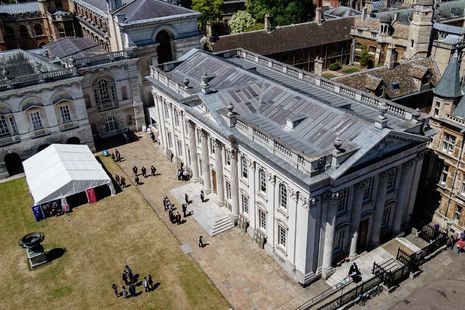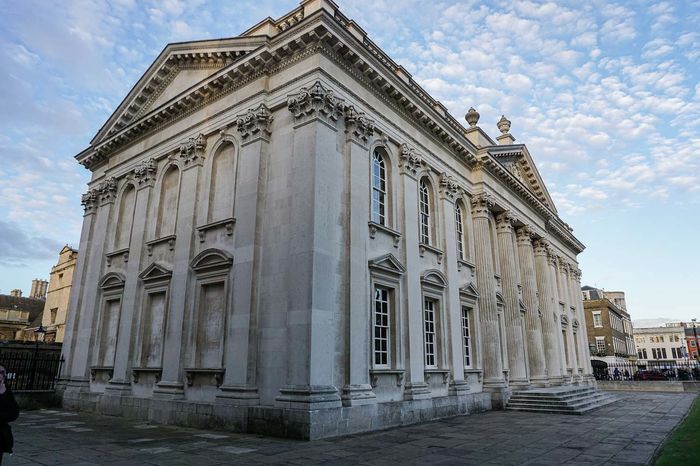Office for Students advises against ‘sweeping’ protest bans
The guidance will take effect from the first of August

The Office for Students (OfS), the independent regulator of higher education in England, has published guidance about how to uphold free speech in English universities.
The 67-page document includes guidance on a range of issues, including the appropriate response to protests, the “practicable steps” universities should take to ensure legal free speech among staff and students, and how complaints about breaches of free speech should be dealt with.
It contains a variety of potential scenarios and advice about how universities should react.
One of these hypothetical scenarios is a pro-Palestine encampment being established on a university lawn and a nearby building which are “ordinarily used for graduation ceremonies” at the time of a graduation ceremony.
The OfS recommends that, in such a situation, the occupiers be required to vacate “this particular lawn for the graduation ceremony and celebrations,” but that the university does so “without restricting peaceful and non-disruptive activity on other, unused spaces nearby”.
The regulator advises against broader measures, using the hypothetical example of a 12-month ban on pro-Palestine protests on the lawn and university spaces within a 400 yard radius.
The OfS says that the former option “does not meaningfully restrict the protesters’ opportunity to express their viewpoint,” while the latter is “more sweeping” and targets a “particular viewpoint”.
Professor Jason Scott Warren, a fellow at Gonville and Caius College, told Varsity that, while the circumstances of this hypothetical situation “are not identical to those of Cambridge,” the response advised by the OfS “suggest[s] that the University and Colleges have been guilty of overreach in their desire to protect a non-core element of their activities”.
The OfS emphasises that restrictions which seek to protect the “essential functions” of universities—which include, teaching, learning, research, and relevant administrative functions—should target the “time, place, and manner of speech” of the protests, rather than their specific cause.
The University of Cambridge currently has an injunction against protests in Senate House, Greenwich House, and the Old Schools. The injunction was granted in March and will remain in place until July. Though it broadly prohibits all forms of protest on these sites, the injunction was sought in response to multiple pro-Palestine protests and encampments.
Trinity College and St John’s College also have temporary injunctions against protests taking place on their sites, following two encampments which took place on their land at the end of May and early June. Both injunction applications will be subject to formal hearings in the coming weeks.
Anna Ost, the Senior Legal Officer at the European Legal Support Center, which has intervened in the injunctions sought by Cambridge University, Trinity College, and St John’s College, told Varsity: “While we are still digesting the guidance and will have to wait and see how it begins to be applied, we hope that this guidance will give Universities pause when considering applying for precautionary injunctions against protestors and that they will appreciate that they need to think carefully about the least restrictive options.”
The OfS guidance, which will take effect on the first of August, also addresses the need to prevent any “chilling effect” that may be caused by “frequent, vociferous and intrusive anti-Israel protests”. Therefore, the OfS recognises, it might in some cases be necessary for the university to regulate the “time, place, and manner” of certain protests.
Aside from advising universities about how to respond to protests, the guidance instructs them about how to respond to harassment, how to report on individuals at risk of radicalisation, how to protect religious views, and how to protect guest speakers’ freedom of speech.
Professor Arif Ahmed, the Director for Freedom of Speech and Academic at the OfS and a fellow at Gonville and Caius College, told the BBC after the publication of the guidance that students should expect to face views they consider offensive, because this is “part of the process of education”.
A University spokesperson told Varsity: “Like others, we are taking time to consider the new guidance.”
Trinity College and St John’s College were contacted for comment.
 News / Colleges charge different rents for the same Castle Street accommodation2 March 2026
News / Colleges charge different rents for the same Castle Street accommodation2 March 2026 News / News in Brief: waterworks, wine woes, and workplace wins 1 March 2026
News / News in Brief: waterworks, wine woes, and workplace wins 1 March 2026 News / Angela Merkel among Cambridge honorary degree nominees27 February 2026
News / Angela Merkel among Cambridge honorary degree nominees27 February 2026 News / Climate activists protest for ‘ethical careers policy’1 March 2026
News / Climate activists protest for ‘ethical careers policy’1 March 2026 News / King’s hosts open iftar for Ramadan3 March 2026
News / King’s hosts open iftar for Ramadan3 March 2026









